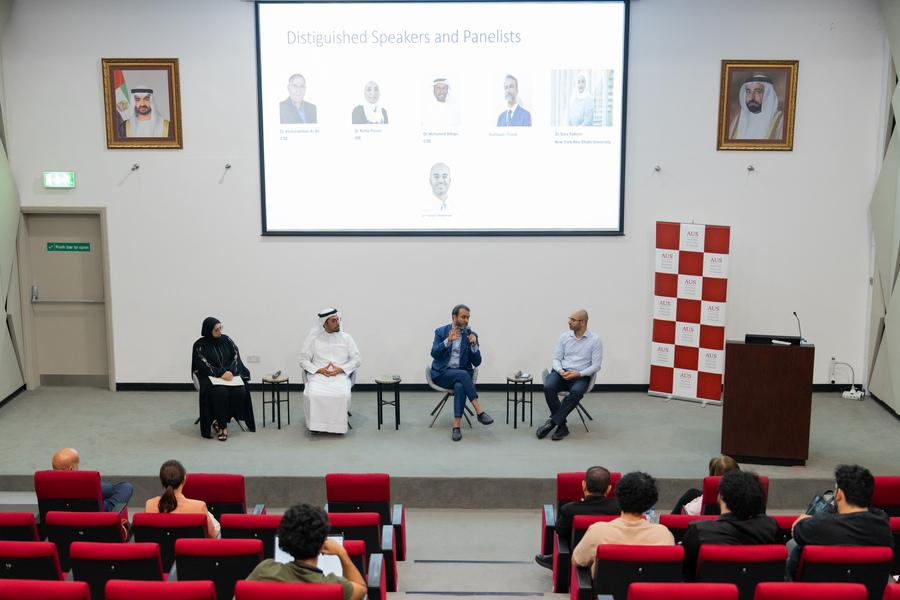- About
- Admissions
- Study at AUS
- Prospective Students
- Bachelor's Degrees
- Master's Degrees
- Doctoral Degrees
- Admission Publications
- International Students
- Contact Admissions
- Grants and Scholarships
- Sponsorship Liaison Services
- Testing Center
- New Student Guide
- File Completion
- New Student Orientation
- Payment Guide
- Executive Education
- Students with Disabilities
- Academics
- Life at AUS
- Research
- Contact Us
- Apply Now
- .

AUS AI symposium advances UAE’s AI 2031 Vision, exploring transformative impacts across key sectors
A platform for over 150 participants to exchange insights on AI-driven advancements and responsible development practices
Building on its mission to advance cutting-edge knowledge and support the UAE’s Artificial Intelligence 2031 strategy, the Department of Industrial Engineering at American University of Sharjah (AUS) recently gathered over 150 faculty members, students and industry leaders for the symposium AI for Complex Systems: Unlocking Opportunities, Addressing Challenges. The event examined how artificial intelligence (AI) is reshaping essential sectors, including education, logistics and manufacturing, highlighting AUS’ commitment to driving innovation and fostering collaboration between academia and industry.
The symposium began with a welcome address from Dr. Fadi Aloul, Dean of AUS College of Engineering, who emphasized the pivotal role that AI plays in transforming engineering education. He highlighted how this evolution equips graduates to better tackle real-life problems and meet industry demands. He highlighted that the college is actively embedding AI across all programs, enhancing students' readiness for a technology-driven workforce. Following his remarks, the event featured a series of insightful sessions led by AUS faculty and industry experts, each examining the transformative power of AI and the ethical considerations surrounding its implementation. Dr. Abdulrahman Al-Ali, Professor of Computer Engineering, opened the sessions with “Practical Ways to Integrate Generative AI in Higher Education,” showcasing how AI-driven tools are revolutionizing academic practices and advancing research. Dr. Sara Saboor, Research Associate from New York University Abu Dhabi, engaged the audience with her presentation, “EthicAI - Opportunities and Challenges,” urging a balanced approach to AI development that considers both its potential benefits and ethical implications.
Adding an industry perspective, Rishikesh Vimalkani, President of the Supply Chain and Logistics Group in Dubai, shared insights on “Leveraging AI: In Search of the Better Human.” He discussed how AI-driven innovations are enhancing human capabilities in logistics and supply chain management, helping organizations achieve greater operational efficiency. Further advancing this theme, Dr. Mohamed Alhajri, Assistant Professor of Computer Science and Engineering at AUS, presented “Edge AI Unleashed: Shrinking Massive Models for Real-Time Intelligence.” His talk highlighted the role of streamlined AI models in powering real-time intelligence, essential for industries that rely on instant decision-making.
Dr. Noha Hassan, Professor of Industrial Engineering, also contributed with “Smart Technologies Powering the Future of Manufacturing – Evolution of Industry 6.0,” discussing how Industry 6.0 is transforming manufacturing processes into adaptive, data-centric systems, paving the way for a new era in industrial development powered by smart technologies.
Emphasizing AUS’ commitment to experiential learning in AI, the 3-Minute Thesis AI Challenge invited industrial engineering students to showcase their AI projects in a rapid, three-minute format. Judged on presentation, research quality and impact, students highlighted real-world applications and innovations in AI.
The symposium concluded with an engaging panel discussion featuring Dr. Saboor, Dr. Alhajri, and Vimalkani, who also delivered individual sessions earlier in the day. The panelists explored the future of AI in Industry 6.0, ethical dimensions of AI and strategies for integrating AI within complex systems. This concluding dialogue provided valuable perspectives on AI’s role in the evolving industrial landscape and underscored the importance of responsible development practices.
Reflecting on the symposium’s impact, Dr. Abdulrahim Shamayleh, Head of the Department of Industrial Engineering and chair of the organizing committee, said: “Our goal is to cultivate a generation of AI experts equipped to address real-world challenges. This symposium bridged academia and industry, providing AUS students with invaluable insights that will empower them to lead in an AI-driven future. By focusing on practical applications, we ensure our students gain skills that are directly relevant and transformative.”
Dr. Vian Ahmed, Professor of Industrial Engineering at AUS and organizing committee member, highlighted AUS’ dedication to bridging academia and industry in advancing AI education.
“This event bridges the gap between academia and industry, reinforcing AUS’ dedication to shaping the future of AI and cultivating the next generation of engineers and technologists. Our approach prepares students with both a strong theoretical foundation and the hands-on skills needed to make meaningful contributions in society and industry. By aligning academic expertise with real-world demands, we provide students with experiences essential to their future careers,” Dr. Ahmed said.
The AUS Department of Industrial Engineering offers dynamic undergraduate, master’s and PhD programs that equip students to design and implement innovative, data-driven solutions for complex systems. Emphasizing experiential learning, industry collaboration and a curriculum focused on sustainability and AI, the department prepares graduates to lead across diverse fields and tackle real-world challenges with confidence and expertise. To learn more about the department, visit www.aus.edu/cen/department-of-industrial-engineering.

